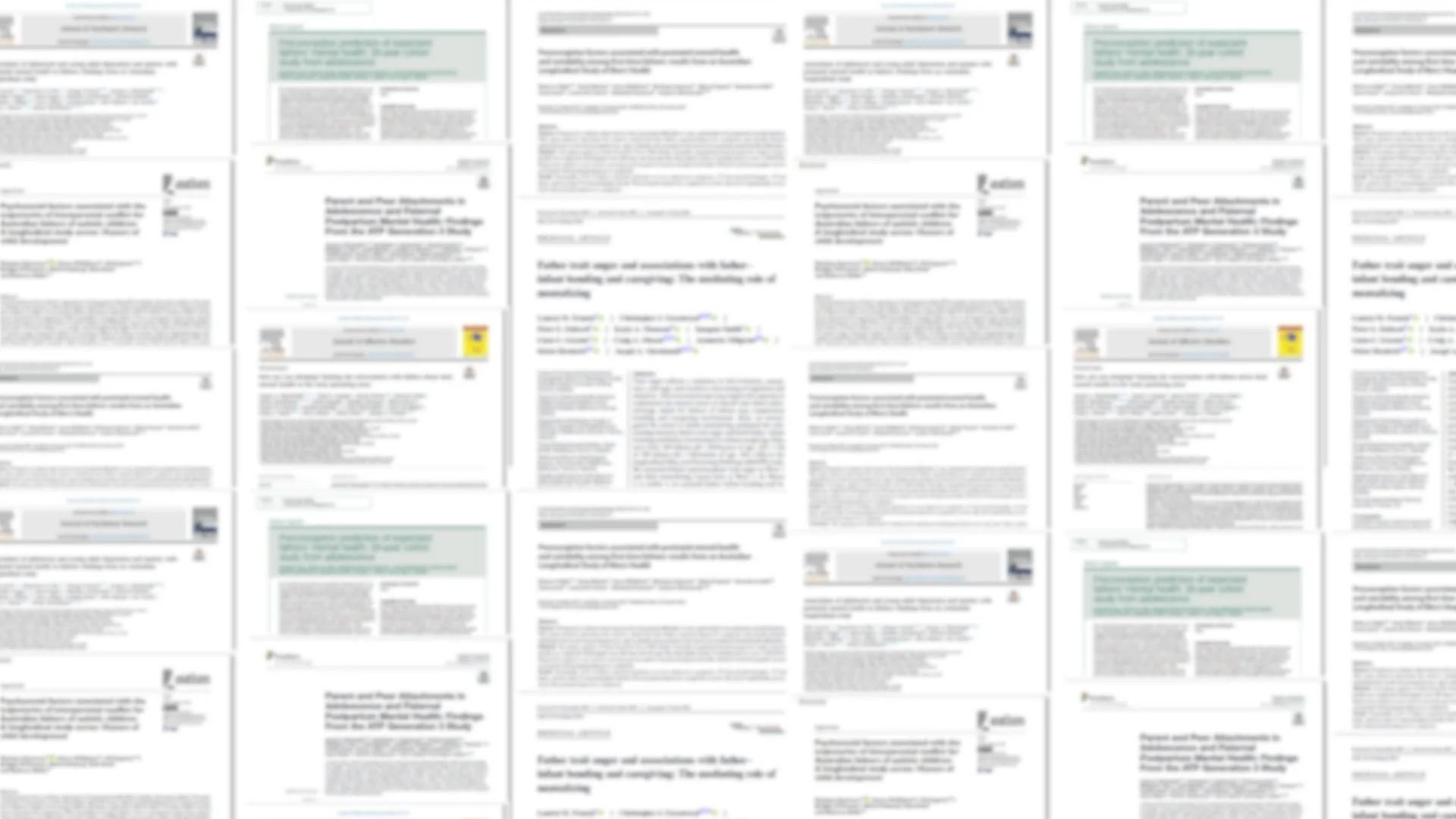
About the Fatherhood Knowledge Bank
Coming Soon!
The Fatherhood Knowledge Bank will be a hub for high-quality literature reviews related to fatherhood. The review summaries will provide the most up-to-date evidence on what matters for preparing for fatherhood, understanding the diverse needs of fathers, evidence-based supports for fathers, and the ways in which fathers impact their partners and children. Where possible, reviews will be ‘living reviews’ - where regular updates are powered by artificial intelligence technologies that accelerate access to current and evolving knowledge.
The Knowledge Bank is in development and will be updated on an ongoing basis.
Living Reviews in Development
-
The objective of this review is to create a living review with regular updates to incorporate new evidence which:
Identifies and evaluates the prospective longitudinal evidence of preconception and prenatal predictors of paternal mental health problems in early parenthood (<5 years postpartum).
Estimates the size of aggregated effects where there are two or more studies of comparable predictors.
Identifies opportunities to disrupt pathways to paternal mental health problems by examining sub-group differences.
Citation:
Jacqui Macdonald, Lauren Francis, Ebony Biden, Kayla Mansour. Predictors of paternal mental health in early parenthood: A living systematic review and meta-analysis of longitudinal studies. PROSPERO 2024 Available from https://www.crd.york.ac.uk/PROSPERO/view/CRD42024529277 -
The Objective of this review is to create a living review with regularly updates to incorporate new evidence which:
Identifies and evaluates the evidence identified in interventions that assess (as an outcome) symptoms of paternal mental health problems in the early parenting years (<5 years postpartum).
Estimates the size of aggregated effects where there are two or more studies of comparable interventions.
Includes sub-group analyses to ascertain whether effects vary by differing characteristics such as intervention modalities, mental illness presentations, timing of intervention (e.g., preconception, prenatal, postnatal, toddler years), or treatment targets (e.g., individual cognitions, affect or behaviours; dyadic interactions; environmental conditions)
Given this review will be part of a series of living evidence updates related to paternal mental health, we will further examine alignment between the reviews. Specifically, we will assess whether interventions address social determinants of paternal postnatal mental health as identified in the FLKB review ‘Prospective determinants of paternal mental health in early parenthood: Protocol for a living systematic review and meta-analysis of longitudinal studies’ (https://osf.io/6mh7e/).
Citation:
Jacqui Macdonald, Lauren Francis, Kayla Mansour, Ebony Biden. Early fatherhood mental health interventions: A living systematic review and meta-analysis of RCTs. PROSPERO 2024 Available from https://www.crd.york.ac.uk/PROSPERO/view/CRD42024528801
Content in development
-

Preparing for Fatherhood
In the years before conception, what factors influence and predict how well men will adjust to fatherhood?
-

The needs of fathers
What does research tell us about the diverse needs of fathers?
-

Supporting Fathers
Evidence-based supports for fathers
-

Fathers and Families
How does the wellbeing of fathers impact that of children and partners?
FAQs
-
Living Reviews are a modern approach to literature reviews that streamline and accelerate the process. Unlike traditional reviews, which are updated infrequently, Living Reviews are continuously updated as new research becomes available. This ensures that the latest evidence is readily accessible and can be translated into practice more efficiently.
-
The first two living reviews in the Fatherhood Knowledge Bank will be launched when the first iteration of each review is complete.
Inclusion of additional reviews in the Fatherhood Knowledge Bank will occur in three stages: The first reviews included will be those funded by the Medical Research Future Fund; the second stage will include a selection of reviews identified by the AFRC systematic review working group as high-quality and high-impact; and stage three will then open up for expressions of interest for review inclusion in 2026.
-
The Fatherhood Knowledge Bank has received intial funding from the Medical Research Future Fund (MRFF) as a key output of 1 in 10 men: Informing prevention of and treatment for paternal mental health problems.
The 1 in 10 Men project was funded to develop a Fatherhood Living Knowledge Bank that, supported by artificial intelligence, will ensure a continual flow of emerging evidence from around the world to inform best practice supports for men in the pre-fatherhood years, as well as antenatal and perinatal periods.
The project is further establishing a Fatherhood Lifecourse Research Alliance. This Alliance will employ innovative multi-cohort data-analytic techniques and draw on the world’s most advanced longitudinal studies of mental health & wellbeing.
These world class assets will culminate in the creation of ‘Living’ Guidelines for Paternal Preconception Mental Health Care that will ensure that practitioners are only working with the most up-to-date evidence base and best practice guidance.
Check back for updates on the development of the Fatherhood Knowledge Bank throughout 2026.
